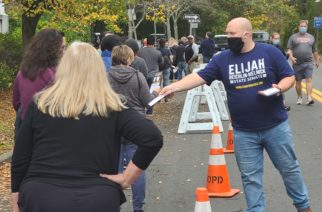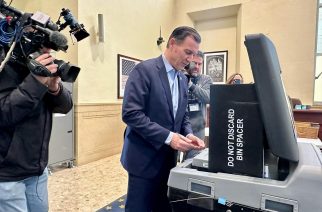
In a sharply divided country, Americans agree on this: the bigger danger to the United States comes from within. Seventy-six percent say they think political instability within the country is a bigger danger to the United States compared to the 19 percent who think other countries that are adversaries of the United States are the bigger danger, according to a new Quinnipiac University poll.
When asked, “What do you think is the bigger danger to the United States: other countries that are adversaries of the United States or political instability within the United States?” 76 percent of the 1,313 adults polled responded with “instability in the United States. Nineteen percent said “adversaries of the U.S.” and 5 percent had no opinion.
Broken down by political party, Democrats say 83 – 13 percent, independents say 78 – 19 percent, and Republicans say 66 – 29 percent that political instability in the U.S. is the bigger danger.
The poll was conducted January 7 – January 10, in the days immediately following the one-year anniversary of the storming of the U.S. Capitol.
A majority of the Americans polled — 58 to 37 percent — said the nation’s democracy is in danger of collapse.
By political party, Republicans say 62 – 36 percent, independents say 57 – 39 percent, and Democrats say 56 – 37 percent they think the nation’s democracy is in danger of collapse.
Just over half of Americans — 53 percent — expect political divisions in the country to worsen over their lifetime, 28 percent expect them to remain about the same, and 15 percent expect them to ease.
“A fear of the enemy within, not a foreign threat, punctuates a grim assessment by Americans of a democracy in peril and a future of deepening political divisions,” said Quinnipiac University Polling Analyst Tim Malloy.
Just over half of Americans (53 percent) think it is either very likely (19 percent) or somewhat likely (34 percent) that there will be another attack in the United States like the one that happened at the U.S. Capitol on January 6, 2021. Forty-three percent think it is not so likely (22 percent) or not likely at all (21 percent).
On the Congressional investigation of the storming of the U.S. Capitol on January 6, 2021, 61 percent support the investigation while 33 percent oppose it.
Democrats support the investigation 83 – 15 percent, independents support it 65 – 30 percent, while Republicans oppose it 60 – 36 percent.
Fifty percent say the storming of the U.S. Capitol on January 6, 2021 was an attack on democracy that should never be forgotten, while 44 percent say too much is being made of the storming of the U.S. Capitol and it’s time to move on. That compares to a Quinnipiac University Poll on August 4, 2021 when 57 percent said it should never be forgotten and 38 percent said it was time to move on.
As for former President Trump and how much responsibility, if any, he bears for the storming of the U.S. Capitol on January 6, 2021, the Quinnipiac poll shows that 43 percent say Trump bears a lot of responsibility for it, 18 percent say he bears some responsibility, 16 percent say not much responsibility, and 20 percent say none at all.
The results are similar to an October 2021 Quinnipiac University survey.
As Congress and the New York State Legislature press for expanding voting rights and voting protections through new laws, Americans say 57 – 34 percent that they do not believe there was widespread voter fraud in the 2020 presidential election. Republicans, however, say 71 – 22 percent that they believe there was widespread voter fraud.
These numbers are similar to February 2021 when Americans said 59 – 36 percent that they did not believe there was widespread voter fraud in the 2020 presidential election, but Republicans said 76 – 19 percent that they believed there was widespread voter fraud.
Looking toward the 2022 midterm elections this November, Americans are split on which party they would want to see win control of the United States House of Representatives as 43 percent say the Republican Party, 42 percent say the Democratic Party, and 16 percent did not offer an opinion.
That’s compared to November 2021 when 46 percent said the Republican Party, 38 percent said the Democratic Party and 16 percent did not offer an opinion.
As for which party they want to see win control of the United States Senate, 45 percent say the Republican Party, 41 percent say the Democratic Party, and 14 percent did not offer an opinion.
Americans give Republicans in Congress a negative 26 – 62 percent job approval rating with 13 percent not offering an opinion.
Americans give Democrats in Congress a negative 30 – 59 percent job approval rating with 11 percent not offering an opinion.
Roughly 6 in 10 Americans (62 – 30 percent) say the Democratic Party is more committed to individual politicians than the principles of the U.S. Constitution.
More than half of Americans (56 – 36 percent) say the Republican Party is more committed to individual politicians than the principles of the U.S. Constitution.
For this current poll, 1,313 U.S. adults nationwide were surveyed from January 7th – 10th with a margin of error of 2.7 percentage points.









